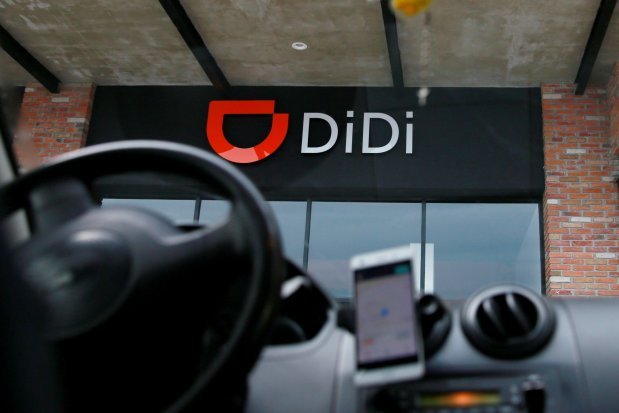VW in talks to manage 100,000-car fleet for rideshare giant Didi

Volkswagen AG, the world's biggest automaker, is in talks to form a joint venture with China's Didi Chuxing to manage part of the ride-hailing company's fleet of cars and help develop "purpose-built" vehicles for Didi's services.
As part of the deal between Volkswagen and China's biggest ride-hailing service, expected to be signed early next month, the German automaker will initially manage a fleet of about 100,000 new vehicles for Didi, of which two-thirds will be Volkswagen Group cars, said a senior executive at the carmaker.
Volkswagen will also jointly buy some new cars with Didi to allow the Chinese company to expand its fleet. The two eventually plan to collaborate to design and develop dedicated vehicles, he said, speaking on condition of anonymity as the details are still private.
Volkswagen is also be part of an alliance of 31 companies, including Toyota and Renault-Nissan-Mitsubishi — to develop cheap, electrified vehicles for China.
The executive did not give financial details of the deal but said that Volkswagen will get a slice of the revenue once the venture develops.
The growing popularity of ride-hailing services for commuting and running errands in congested cities such as Beijing and Shanghai is showing early signs of reducing private car ownership. This could have serious consequences for existing carmakers and is forcing companies like Volkswagen to reinvent their businesses and seek out future revenue streams.
"To succeed as a car company in this new ecosystem, we need to know who our customer is, what their journey is and what our strategy should be," the executive said.
He added that this deal will eventually give Volkswagen access to some of Didi's massive trove of data on customer behavior collected through the 3 million rides Didi provides in China each day.
The ultimate goal is the production and use of autonomous cars, the Volkswagen executive said.
Developing a different kind of car
Volkswagen's partnership with Didi is the first known project Didi has begun pursuing as part of a broad alliance the Chinese company recently formed with 31 automakers and parts suppliers.
Didi has said it formed the alliance to collaborate on, among other things, eventually developing cars purpose-built for its services.
For instance, as many as 80 percent of Didi customers ride alone and don't need a big four-seater car, the Volkswagen executive said.
And current vehicles have engines and other technology that allow them to go as fast as 150 mph (250 kmph). Dedicated ride-sharing vehicles would always travel much slower, so they would not need to be aerodynamic or have a powerful engine. That could allow for fewer seats and more room for luggage.
Didi has also predicted much of its future fleet would be electric. The company has begun working with Chinese carmakers GAC Motor and CHJ Automotive to design electric vehicles, sources have told Reuters.
Three Didi officials said the ultimate shape of a new ride-sharing market is still unclear, and no one knows what role car manufacturers and Didi itself will play in it.
Open questions for Didi are how to repair, maintain and direct a fleet of autonomous vehicles, one of the officials said.
"Our understanding right now is that probably automakers don't know 100 percent how to do all that. Didi also doesn't know either," the official said.
A spokesperson for Didi said both sides were still working out the details of how the partnership would look.
"Potentially, both parties willfocuson building together a fleet operation business, and look into other potential areas such as designing new car models for ride-hailing," the spokesperson said.
The Didi officials did not want to be named because they are not authorized to talk to reporters.
After years of resistance and efforts to keep technology-based ride companies at arm's length and vowing never to be like contract manufacturers are to the mobile phone sellers, carmakers are becoming more flexible.
The car industry fears becoming like Taipei-headquartered electronics company Foxconn, which manufactures millions of phones for the likes of Apple but only gets a slim share of the profits in return.
This year, automakers like Fiat, Jaguar Land Rover and Honda entered into an agreement to provide thousands of cars to Alphabet Inc's self-driving unit, Waymo. Last year Volvo and Daimler AG said they would supply cars to Uber.
VW's $18 billion plan
Volkswagen lags its rivals Daimler and BMW in embracing the transformation but has recently stepped up its efforts.
It has created a war chest of 15 billion euros ($18.2 billion), which it plans to use for investments in ride-hailing, autonomous driving, digitalization, electric mobility and other services in China by 2022.
It has already invested in an artificial intelligence firm called Mobvoi, a car-sharing company Shouqi and a second-hand car buying company. Volkswagen is also in talks to invest in a luxury ride-hailing company and an electric car charging business, the executive said.
Once Volkswagen has access to customer data, it will be able to make better-informed decisions on future businesses and products.
"We will explore additional business models with Didi," the executive said, adding that these may not necessarily be focused only on China. Volkswagen is internally discussing bus and truck sharing.
"We don't need to have all the answers. The money we plan to put into the first phase should help us find some," he said.
The executive did not say whether the new cars provided by Volkswagen would be electric, hybrid or gasoline.
Related News
